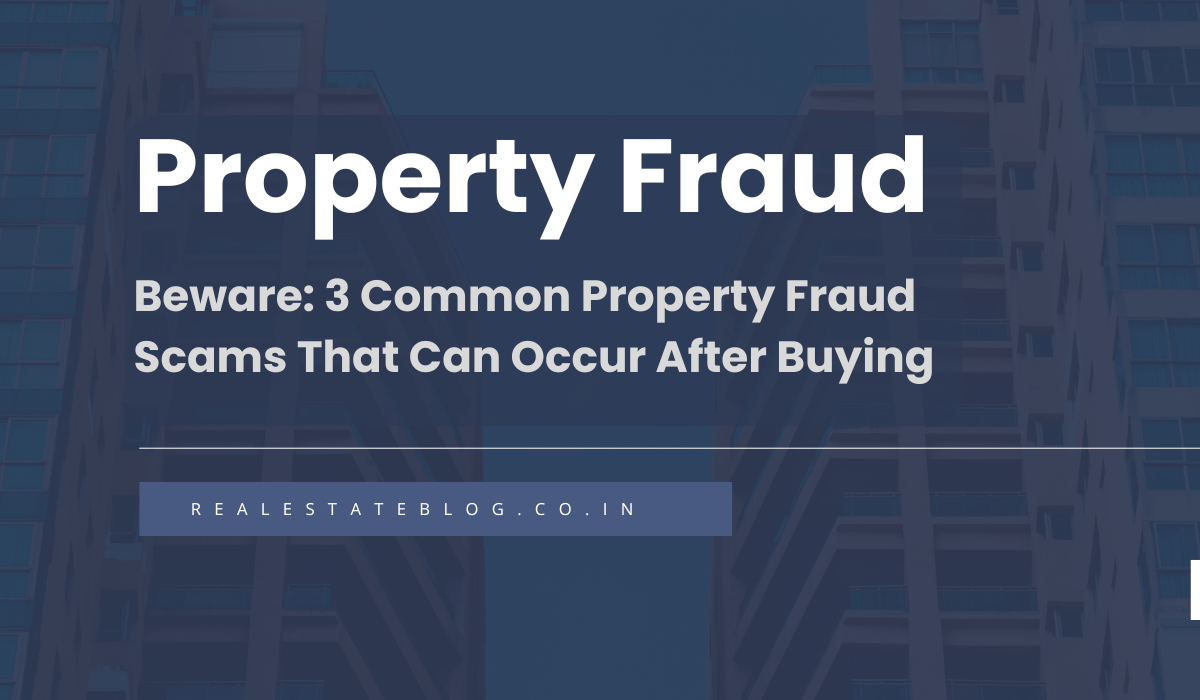Hello, friends! Today, we’re going to talk about a very important topic that every property buyer should be aware of: property fraud. You might think that once you’ve bought a property, you’re safe from any kind of fraud or scam, right? Unfortunately, that’s not always the case. In this blog post, we’ll discuss three common types of property fraud that can occur even after you’ve purchased a property, and what you can do to protect yourself.
The Scary Reality of Property Fraud
Before we dive into the specifics, let’s take a moment to understand the gravity of the situation. Imagine this: you spend your entire life working hard, saving money, and finally investing in a property that you believe will secure your future. But then, you find out that you’ve been deceived. You’re not alone. There are countless people out there who have fallen victim to property fraud, and now they’re stuck in long, drawn-out court cases, fighting to get what’s rightfully theirs.
“A person spends his whole life earning to buy a property. Or say that he spends his life on the price. And what does he get in return? Deceit.”
It’s a harsh reality, but it’s one we must face. So, let’s arm ourselves with knowledge and learn about the three most common types of property fraud that can occur after buying a property.
Fraud #1: Title Fraud
The first type of fraud we’ll discuss is title fraud. This happens when there’s an issue with the ownership of the property you’ve purchased. Let’s look at an example to understand this better.
Suppose you bought a house from Naman. Everything seemed valid, and you checked all the documents. However, suddenly, after 20 days, Naman’s brother sends you a notice claiming that the property you bought was jointly owned, and Naman had no right to sell it without his consent.
In such cases, you’re left with a property that you can’t legally claim as your own. The solution? Always make sure to get a thorough title search report done by a lawyer before buying a property. This report will help you identify any potential issues with the ownership of the property.
Unlock Your Dream Home Today!
Get personalized real estate insights delivered straight to your inbox.
Another practical solution is to ask around and find out the background of the property. Is it a family property? Are there any disputes? Doing your due diligence can save you a lot of headaches in the future.
Fraud #2: Possession Fraud
The second type of fraud is possession fraud. This occurs when you have the right title to the property, but someone else is in possession of it. The best example of this is in cases of disputes with tenants.
Let’s say you bought a house from someone, but when you go to take possession, you find out that there are tenants living there. You can’t just kick them out, even though you’re the rightful owner. You’ll have to go through a lengthy legal process to evict them, which can take years.
In fact, Naman shares a shocking story about his wife’s property in Delhi:
“My wife Shruti has a property worth 25 crores in Delhi. And if you ask her now, her parents can’t afford to pay for a month. They have all the property and tenants. About 50 years ago, there was an agreement of 200-500 rupees. I filed a case in 4 or 5. It’s going on. My father-in-law has expired. Now who will look? The property is under pressure.”
So, what can you do to avoid possession fraud? The simplest solution is to physically verify the property before buying it. Go to the property yourself and check if there’s any possession issue. If you’re buying agricultural land or a big plot, make sure to put up a boundary and take pictures to prove that you’ve taken possession.
Fraud #3: Power of Attorney Fraud
The third and final type of fraud we’ll discuss is power of attorney fraud. This happens when you buy a property based on a power of attorney, but later find out that the power of attorney was either fraudulent or had been revoked.
For example, let’s say Rohan, who lives in the USA, gave Naman the power of attorney to sell his house. You bought the house from Naman, thinking everything was legal. But then, after 10 days, Rohan comes back and says that he had revoked the power of attorney, and Naman had no right to sell the house.
In other cases, the power of attorney itself might be fraudulent. Naman could have used the same power of attorney to sell the house to multiple people, leaving you in a legal mess.
So, how can you protect yourself from power of attorney fraud? The best solution is to avoid buying properties based on power of attorney altogether. Always insist on a registered sale deed. If you must buy a property with a power of attorney, make sure to do the following:
- Contact the owner directly and get a written confirmation that the power of attorney is valid.
- Make the owner a witness in the property documents.
- Transfer the money directly to the owner’s account, not the power of attorney holder’s account.
The Way Forward
Now that we’ve discussed the three most common types of property fraud, you might be wondering: when will things improve? When will we have a system in place that prevents these frauds from happening?
The good news is that there are some positive changes on the horizon. The government is working on linking all properties with Aadhaar cards, which will make it much harder for fraudsters to operate. As Naman says:
“Wait. All the properties are linked with Aadhaar card. And as I have heard about the dream project of Mr. Modi, it is going to change a lot. If your Aadhar card gets linked, you won’t be able to do fraud.”
However, until that happens, it’s up to us to be vigilant and take all necessary precautions when buying a property. Remember, a little bit of due diligence can go a long way in protecting your hard-earned money and securing your future.
Key Takeaways
Let’s recap the main points we’ve covered in this blog post:
- Title Fraud: Always get a title search report done by a lawyer and find out the background of the property before buying.
- Possession Fraud: Physically verify the property and take possession before buying.
- Power of Attorney Fraud: Avoid buying properties based on power of attorney. If you must, take extra precautions to ensure the power of attorney is valid.
- Be Vigilant: Don’t let your guard down even after buying a property. Be aware of these common frauds and take steps to protect yourself.
Conclusion
Friends, investing in a property is a big decision, and it’s not one to be taken lightly. While we all hope for a smooth and hassle-free process, the reality is that property fraud is more common than we’d like to admit. However, by being aware of these common scams and taking the necessary precautions, you can protect yourself and your investment.
Remember, knowledge is power. The more you know about these frauds, the better equipped you’ll be to prevent them from happening to you. So, share this information with your friends and family, and let’s work together to create a safer, more transparent property market for everyone.
Title fraud occurs when there are issues with the ownership of a property you've purchased, such as a previous owner selling the property without the consent of co-owners.
To protect yourself from title fraud, always obtain a thorough title search report from a lawyer before purchasing a property and investigate the property's background for any possible disputes.
Possession fraud happens when you have the legal title to a property, but someone else is occupying it, such as in disputes with tenants.
To avoid possession fraud, physically verify the property before buying it, and ensure there are no occupants or legal disputes regarding possession.
Power of attorney fraud occurs when a property is sold based on a power of attorney that is either fraudulent or has been revoked by the actual owner.
To safeguard against power of attorney fraud, avoid purchasing properties based on power of attorney unless necessary, and always confirm the validity of the power of attorney directly with the owner.
If you discover property fraud after buying, consult a legal professional immediately to understand your options and the best course of action.
Yes, the government is working on linking all properties with Aadhaar cards, which will help reduce the opportunity for fraudsters to operate.
Due diligence is crucial in property transactions as it helps identify potential issues and frauds before you finalize a purchase, protecting your investment.
If you suspect property fraud, gather all relevant documents and evidence, and consult with a legal expert or local authorities to report your concerns and seek guidance.
DISCLAIMER
The information provided on this website is for general informational purposes only. While we strive to keep the content up-to-date and accurate, we make no representations or warranties of any kind, express or implied, about the completeness, accuracy, reliability, suitability, or availability of the information, products, services, or related graphics contained on this website.
In no event will we be liable for any loss or damage including without limitation, indirect or consequential loss or damage, or any loss or damage whatsoever arising from loss of data or profits arising out of, or in connection with, the use of this website.
Real Estate Investment Risks
Real estate investments involve significant risks and market volatility. Property values, rental rates, and market conditions can fluctuate. Past performance is not indicative of future results.
Before Making Real Estate Decisions
Before making any real estate decision, we strongly advise you to:
- Conduct thorough due diligence
- Consult with qualified legal, financial, and real estate professionals
- Carefully review all relevant documents and contracts
- Consider your personal financial situation and investment goals
This website does not provide legal, financial, or investment advice. All content is for informational purposes only and should not be construed as professional advice or recommendations.
By using this website, you acknowledge and agree to these terms. We reserve the right to modify this disclaimer at any time without notice.






